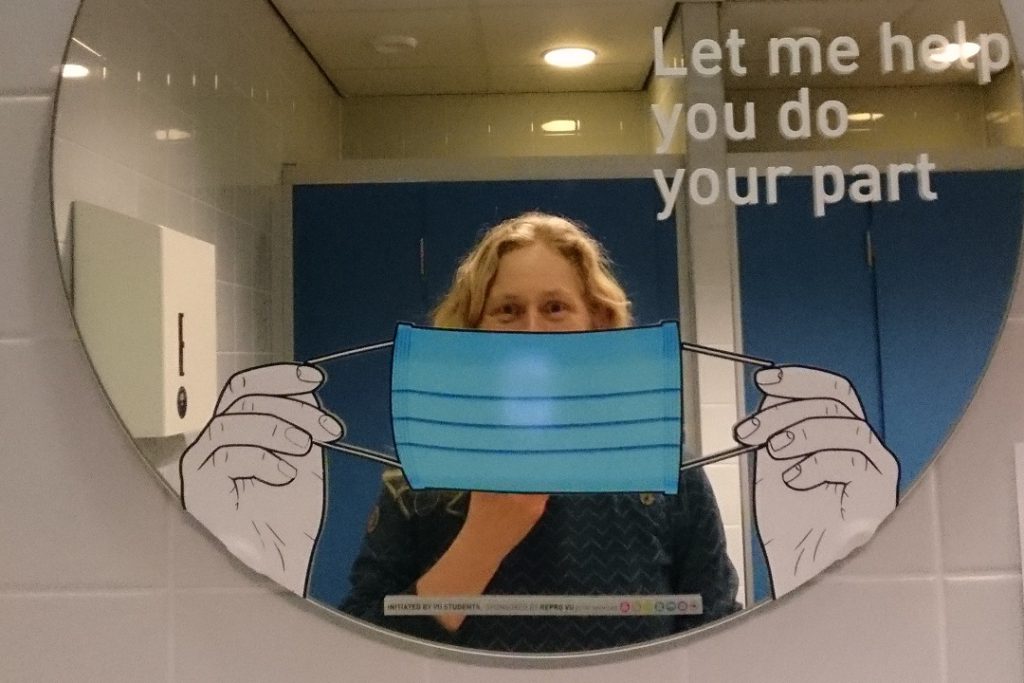If you visit the VU Amsterdam campus, your behavior could be influenced by motivational techniques initiated by students. They’re taking the class Nudge: Influencing Behavior as part of the minor ‘Understanding and influencing decisions in business and society’.
Have you visited a bathroom at VU Amsterdam recently? If so, it’s likely you noticed a sticker of a face mask prominently placed on the mirror above the sink. This is one of the ‘nudging interventions’ on campus. It was conceptualized by students following a marketing class. The intervention was coordinated by Campus Facility Management with help from Repro VU.
This nudging intervention gives people a slight extra push to change their behavior regarding the coronavirus guidelines. It is not meant to reward, punish or inform, but rather to redecorate the environment in a way that makes it easier to choose the desired behavior – in this case to follow the coronavirus guidelines in order to curb the pandemic.
According to Associate Professor Marketing Femke van Horen, who gives the class together with AIO Seongun Jeon, people react more positively to these interventions than to typical informative posters. “A sticker like this on the mirrors draws your attention, it clarifies the social norm and activates positive emotions. This causes students to be more likely to put the message or request into practice. Oftentimes people don’t know exactly how to act in their environment. These stickers remind everyone to follow the coronavirus guidelines.”
Healthy snacks at the front
The design of our environment always has an impact on our behavior, according to Van Horen. This often pans out negatively: “We know that people actually tend to behave irrationally without being aware of it”. She points out the example of a buffet. The placement and accessibility of the food and beverages, influence our choices. By placing healthier snacks and beverages at the front, they become more popular choices.
‘We know that people actually tend to behave irrationally’
VU Amsterdam students have been developing nudges for years, but actually implementing them on campus is a new development. “Communication and Marketing of VU Amsterdam is largely utilizing the old tools, such as informational posters. This often proves to be ineffective. We joined hands now to influence behavior in another way”, says Van Horen.
The theory is clear, but how do we know if the interventions actually work as planned? Is someone keeping track of changes, for instance in the behavior of those inspired by the mirror stickers? “That would be appropriate”, responds Van Horen. “Checking up on the results to determine the general effectiveness of interventions is very important.” This could be done by placing the stickers on specific floors of a VU Amsterdam building, while other floors remain stickerless. It could then be observed which floors show the most compliance with the face mask rules.
Van Horen is in favor of testing interventions before they are implemented on a larger scale, but she is glad to see VU Amsterdam using nudging interventions in the first place.
Stickers of a ravine
That brings into question whether these nudging interventions could backfire. If they are experienced as being pedantic, won’t people do the opposite of what is desired from them? According to Van Horen that is always possible, but she thinks that this is less likely with nudging interventions than with the old-fashioned ways of disseminating information.
Aside from the stickers, the campus will have two more nudging interventions from students. To ensure that people keep an appropriate amount of distance from each other, large stickers depicting a ravine will be placed near elevators. This instigates fear in people, making it more likely that they will keep their distance. And to reduce littering and encourage waste separation, something resembling basketball nets will be used for people to dunk their waste in the correct bin.
